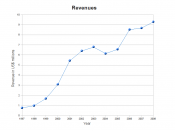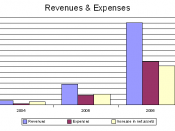Cash basis of accounting
Cash basis of accounting is an accounting method in which income is documented when cash is received and expenses are recognized when paid. The cash basis of accounting is not very common amongst large organizations. It does not fall in line with the accounting's matching principle and thus is not accepted by GAAP.
Accrual Basis of Accounting
Accrual basis of accounting is an accounting technique in which income and expenses are recognized when they occur and not when the cash is actually received or paid. Balance sheet of an organization reflects adjustments when revenues are earned either in the form of Cash (if a service or sale takes place) or an increase in Accounts Receivable occurs when the transaction takes place on credit, or when the Unearned Revenues decreases which means that the service was performed after the client had paid the payments in advance. (Gieson, 1995)
Cash vs.
Accrual Basis of Accounting
On the basis of cash, acceptance of revenues is just when cash is received as well as expenses are accepted just when cash is paid. This approach to revenue and expense acknowledgment is not suitable for the reason that it simply deals with cash receipts and disbursements, without revealing economic activity as well. Also, cash basis revenue might be directed by management or cash flows timing. With the growth basis of accounting, revenues are identified when receive in keeping the revenue realization concept, in addition to expenses are identified when sustained in keeping the corresponding rule, despite at the time of receiving or payment of cash. The accrual basis provides increase to accruals (such as, the fiscal occasion is acknowledged earlier than the event of cash) plus deferrals (such as, the fiscal occasion is acknowledged later than the cash event). (Reichelstein, 1998)
These two bases vary in the way in which they treat the issue of when to identify revenues and expenses. The focus of Cash Basis, as its symbol involves, on the cash flow. That is why; every time cash is collected, the acknowledgment of is earned. A related source for the identification of expenses is utilized; specifically each time cash is paid out or distributed the allied expense is acknowledged as having been incurred. Therefore this source seems to be easy and uncomplicated. New comers of accounting students have slight difficulty with it
The Accrual Basis allows for the fact that a business entity's life will broaden into the future, further than the existing time. This way of consideration is implanted in the On-Going or Continuity Concept of GAAP (Generally Accepted Accounting Principles) that basically declared says support to the opposing, a business entity is predictable to have a time which might be broadening into the future. As a result, the actual test under this source of accounting is the purpose of when revenues are to be acknowledged, that is free of any cash flow.
The main analysis for revenues is when it is received. That provides source to a debate that when a business truly earns it revenue. Revenue is produced because of a performance in business overall in a fiscal exchange. Specifically a business takes part in a contractual agreement to switch a performance for a further consideration, which will finally conclude in the cash receipt. However, when its performance is completed, it is allowed to collect that cash; it has received it as revenue. The identification of expenses pursues in a same way. The Matching Concept in accounting formulates it essential that we match each and every expense alongside the revenue that they facilitate to produce. Expenses then pursue a same guide to that of revenue. As soon as expenses are coordinated in required way, they are incurred. Just then, it has to be acknowledged as an expense.
Which method is the best accounting method for an organization?
Cash Basis of accounting is simple to put into practice as compared to accrual basis of accounting. Under the cash basis of accounting a transaction is documented only at the time of receipt of payment of cash. In many circumstances; this accounting method does not give a truthful picture of the organization's financial position. The accrual basis of accounting is more suitable in the condition where the business has significant invoices which are not paid or uncollected revenue at the end of each cycle and the payment varies depending on the transaction that has occurred. When the bills are unpaid or the credit is not returned on time, profits for the company are decreased which can drastically impact the net income in the income statement. For financial reporting, in order to meet the standards given by generally accepted accounting principles (GAAP), the accrual basis of accounting is the best form of accounting to be used by the companies these days.
References
D. E. Van Gieson (1995) "Cash Basis vs. Accrual Basis of Accounting" accessed on 14 February 2007 http://kalama.doe.hawaii.edu/hern95/pt035/Accounting/LEVEL_1INDEPENDENT/CASH-ACR.HTM
Reichelstein, S. (1998) "Providing Managerial Incentives: Cash Flows versus Accrual Accounting," Working paper, Haas School of Business, University of California, Berkeley. http://citeseer.ist.psu.edu/reichelstein98providing.html


